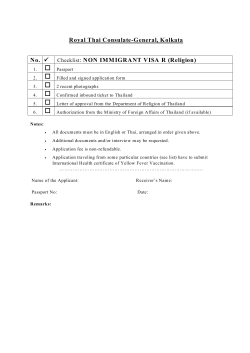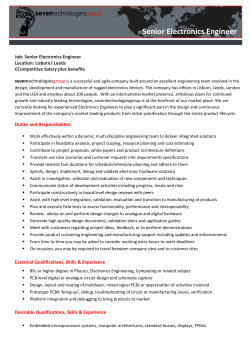
Potential winners and losers from the trend in data center investment
1 Potential winners and losers from the trend in data center investment in Thailand Highlight Thailand’s data center sector has been developing progressively owing to the mounting demand from both private and public sectors. The private businesses views the data center as a significant factor determining the steadiness of their business operation meanwhile the public sector are somewhat driven by the efforts to improve productivity of mutual data processing across state organizations. This leads to a series of investment to establish conventional data center and cloud-based data center. The ongoing trend in aforementioned ICT sector presents a noteworthy opportunities for electronics industry as well as those of technology and telecommunication service providers. Enterprise hard drive and integrated circuits sections of Thai electronics industry are likely to be positively affected by the advent of data center, this is due to the relatively close association of their final goods with the construction and subsequent operation of data centers. Even so, the presence of alternatives made by lower cost foreign suppliers could constitute the waning of competitiveness of Thai electronics industry unless there would be efforts to bolster the proficiency of local businesses and the moving into the higher level of the value chain. Information technology solution firms, namely those in data center service and ICT consultancy, could utilize their existing technological expertise to potentially capture the benefit stemming from data center’s trend by addressing issues of cost-effectiveness, relative sophistication of the system and environment awareness. The sector relating to data center in Thailand is still nascent but have been growing steadily over the years. Fundamental factors driving such growth are the substantial demand for mobile devices and the dependency of the internet economy upon the cloud computing. As of 2013, the data center section underwent unprecedented growth of about 23% upward from the preceding year and generating nearly 2,000 million baht in revenue. Data center is defined as a facility to house computer systems and associated components, such as telecommunications and storage systems. More specifically, a data center comprises of networked computer servers which are used to remotely store information, processing as well as distribution of abundant data. Besides, the data center can exist as the 2 physical office or can present predominantly online in form of the cloud-based data center (CDC). For transnational technology corporations, Thailand is strategically important as a base for pushing into other ASEAN markets such as Laos and Myanmar. The attractiveness of Thailand data center is partly facilitated by the geographical proximity to potential Asia-pacific markets. Besides, there is adequately developed IT and telecommunication infrastructure crucial for data dissemination and network connectivity, this is evident by the considerable level of internet hosts and usage as well as the relatively reliable electricity supply. Likewise, the development of data center in Thailand has been highlighted and promoted by Thailand board of investment with objective to strengthen the nation’s position as an ICT regional hub. There is consistently growing enthusiasm on data center among both public and private sectors. In this respect, a series of investment has been made on the establishment of data centers in recent years. On the government level, data center has been regarded as fundamental for enhancing the effectiveness of information sharing and processing between state agencies. An objective of state owned data center is to remedy the overlapping issue which often occurs when processing documents cross-agencies. To this end, the Provincial Administration Department and the Electronic Government Agency of the Information and Communication Technology Ministry jointly set up a data center meant for storing citizen identification information. This data center has been mainly used by the Royal Thai Police, the Land Transport Department and Revenue Department. The government currently expects the continuing increase in number of state agencies linked up to the data center and projects about 1,000 agencies using such system in 2015. In the private businesses’ perspective, the data center is essential for ensuring their business continuity, particularly in the event of natural disasters or man-made issues i.e. political unrests. To mitigate those of unpredictable risks, various businesses, ranging from financial and manufacturing sectors to telecommunication sectors, have increasingly recognized the importance of having back-up databases or a second data center back up site. A further point, the demand for data center is substantiated by the linkage between data center and cloud computing services. Data center is used by cloud service providers to house cloud services and cloud-based resources. With regards to cloud-hosting, venders also operate multiple data centers to safeguard data availability in the wake of potential outrages and other data centers’ system failure. 3 The consistent development of data centers in Thailand might constitute positive effect to the sub-categories of electronics industry that manufacture parts and components related to data center, especially data storage and semiconductor derivatives. Within the manufacturing sector, the electronics industry has thrived and become a prominent manufacturing industry of Thailand. The electronics sector have had pivotal role in the national economy as an export earner while also paving the way for Thailand to be the leader in the South-east Asia region. Key electronics products are harddisk drive (HDD) and integrated circuits (IC), both account for more than half of total electronics exports. The similarly significant reputation has been noted in IC and semiconductor manufacturing. Thailand has been regarded as the front-runner in the HDD and component production, commanding around 40% of the global production. The hitherto competitiveness of Thai electronics industry arises from the competitive and affordable work force, good logistics system and the development of clusters which are characterized by extensive networks of supporting industries producing majority of parts required in the assembly of final products. A data center utilizes an ample amount of data storage devices and microelectronic chips. Enterprise or datacenter capacity hard drives have been already manufactured in Thailand. Consequently, the rising domestic investment in data centers could bolster the demand and production of enterprise type of HDDs, generally benefiting firms along the value chain of HDD production (Figure 1). Considering that a data center also makes use of various electrical apparatuses in their operation to rigidly control environmental factors and continuously supply power, the overall chip industry should certainly proliferate as well. It should be noted that other electronics sectors such as automotive electronics and agritronic would not be beneficial from the growing data center investment given their clear irrelevance to the essence of data center. Similarly, the consumer electronics, with the exception of computer and telecommunication equipment, is more or less unaffected by the ongoing trend in data center investment. Nevertheless, a fundamental challenge for local electronics businesses is to improve and reinforce the position in the value chain in order to stay abreast of costefficient producers in other Asian countries and to reap benefit from the ascension of Thai data center sector. Currently, the prominent role of local firms is as original equipment manufacturers or subcontractors to assembly final products while the role in research and design of critical components and electronics products are still lacking. Being in the lower stream of value chain (Figure 2), the threat of capital flight is not entirely distant scenario since 4 many raw materials and semi-finished products are imported from aboard rather than locally produced. In the long run, this disadvantage could eventually lead to the importation of data center’s parts and components from cheaper foreign sources in the region namely China and India. Others directly benefited from data center development are data center services providers who could accommodate their growing number of local, regional clients, of different sizes. Some are technology firms that already have foothold in the data center sector. These include both global technology firms such as Fujitsu and those of domestic players namely Siam IDC, TCC Technology and Siam Inet. As an actual fact, investing in own data centers necessitates remarkable funds to procure related software, hardware, construction of the data center’s premise, upkeeps as well as hiring and training skilled personnel to operate the system. Hence, the role of data center service provider is likely to be intensified given their expertise in managing such information network and their clients’ cost minimization incentive. In the light of uptake in cloud adoption, there might be business opportunities for telecommunication and network firms. Cloud data centers particularly relies upon the access to internet, thus speed and connectivity of the network are significant issues. Alongside the proficiency and experiences in technology industry, telecommunication and networks companies would be able to effectively combine the data center management with connectivity services so that they can leverage to create cloud-based infrastructure services. Additionally, the growing presence of data centers might be advantageous for professional services companies specializing in information technology advisory. For data center service providers and private businesses aiming to establish own data centers, those of IT consulting firms are mainly asked for data center strategies and data center model. It is an actual fact that a data center could utilize extensive electricity to operate redundant data communications connections, various security devices and air conditioning used to control the temperature and humidity. It could be noted that the operations of a data center might contribute to high carbon footprint, exacerbating the issue of greenhouse gas emission. In this regard, a potential prospect is the consultation on energy efficiency implementation, particularly for data center with physical presence. 5 Implication In order to promote the favorable interconnection between the ongoing creation of data centers across economic sectors and electronics industry, a series of policy implementation is vital to foster competitive advantage held by Thai electronics industry. The state should encourage the creation of value within the electronics industry. This could be achieved via the successful expansion into upper steams of value chain, particularly the integrated circuit design and the wafer fabrication. Given both financial and technical knowledge constraints facing local electronics businesses, policies aiming at foster their access to financial means and their organizational capabilities are essential. With reference to the advancement of data center, the government may wish to further uphold the attractiveness of information technology businesses as a whole through investment incentives such as limited-term income tax break and an exemption from import duty on machinery and other capital goods. Figure 1: Value chain of HDD production 6 Figure 2: Value chain of Thai electronics industry System design IC Design Wafer Fabrication IC Packaging PCB Assembly Hardware Software Applications Product Assembly White goods Consumer electronics Harddisk Drive Industry applications Automotive electronics Agritronics represents the main electronics industry that Thailand presently has Source: NECTEC By: Nattachai Charusilawong (natt.charu@gmail.com, natt.charu@outlook.com)
© Copyright 2025








![Oral and Written Final Report Guidelines []](http://cdn1.abcdocz.com/store/data/001288525_1-1a0faf6c8c6f9952b250951407e4d204-250x500.png)
